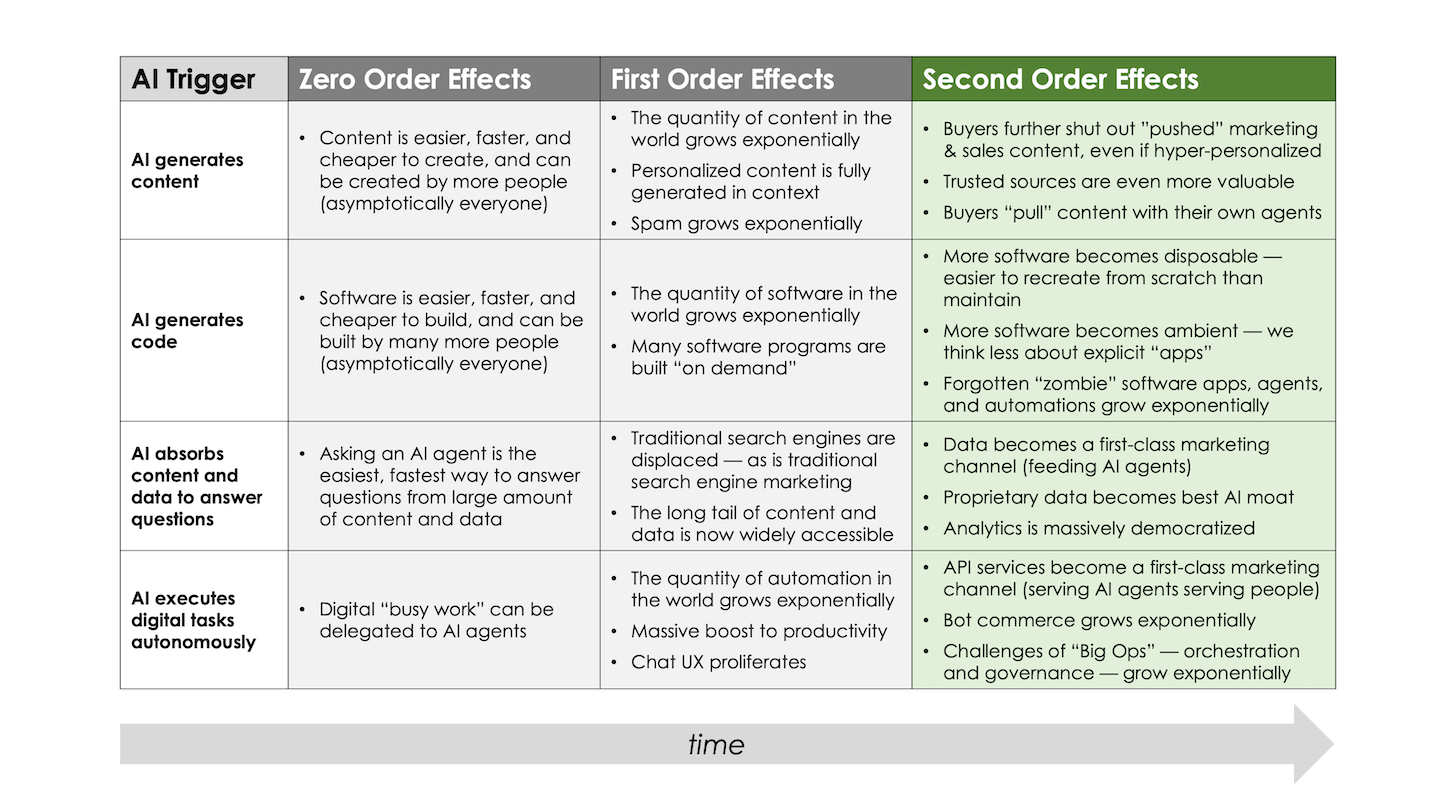AI has had a significant impact on sales software, revolutionizing the way businesses manage sales processes and improve overall efficiency. Today, sales software powered by AI technologies such as machine learning and natural language processing can analyze vast amounts of data, provide accurate sales forecasts, automate repetitive tasks, and assist sales teams in identifying potential leads and closing deals more effectively.
These advancements in AI not only streamline sales operations but also enhance customer experiences by enabling personalized sales interactions and targeted marketing campaigns. With the ability to learn from data and adapt in real-time, AI-powered sales software is transforming the way businesses approach sales, driving increased productivity and revenue generation.

Credit: chiefmartec.com
Ai Integration In Sales Software
Artificial Intelligence (AI) has revolutionized various industries, and the sales sector is no exception. With the integration of AI in sales software, businesses can maximize their efficiency, improve customer engagement, and ultimately boost their revenue. AI technology has the potential to transform the way sales teams operate by automating repetitive tasks, providing actionable insights, and enhancing decision-making processes. In this article, we will explore the benefits of integrating AI in sales software and how it can revolutionize lead generation, sales forecasting, and predictive analytics.
Benefits Of Integrating Ai In Sales Software
Improved Lead Generation And Prospecting
Generating quality leads is a crucial aspect of any successful sales strategy. AI-powered sales software can take lead generation to new heights by streamlining the entire process. By analyzing data from various sources, AI algorithms can identify potential customers, understand their preferences, and predict their likelihood of making a purchase. This enables sales teams to focus their efforts on leads with the highest conversion potential, leading to increased sales and higher revenue.
Furthermore, AI-powered sales software can automate prospecting by leveraging machine learning algorithms to analyze customer interactions, social media data, and other relevant information. This automation saves sales representatives valuable time and allows them to prioritize their efforts in building meaningful relationships with prospects.
Enhanced Sales Forecasting And Predictive Analytics
Sales forecasting is an essential component of effective sales management. AI integration in sales software can greatly improve forecasting accuracy by leveraging historical data, market trends, and customer behavior patterns. The predictive analytics capabilities of AI allow businesses to make more informed decisions based on accurate forecasts.
Through AI-powered sales software, businesses can identify key variables that impact sales performance and adjust their strategies accordingly. This proactive approach enables sales teams to optimize their resources, identify potential obstacles, and seize opportunities at the right time.
Moreover, AI technology can analyze vast amounts of data in real-time, providing valuable insights into customer behavior and preferences. These insights can help sales representatives tailor their pitches and personalized offerings, increasing the chances of closing deals.
In conclusion, AI integration in sales software offers numerous advantages, including improved lead generation and prospecting and enhanced sales forecasting and predictive analytics. By embracing AI technology, businesses can streamline their sales processes, gain valuable insights, and ultimately drive growth. With the continuous advancement of AI, sales teams can expect further optimization and innovation in the future.

Credit: www.statista.com
Challenges And Limitations
Data Privacy And Security Concerns
As Artificial Intelligence (AI) continues to revolutionize the sales software landscape, there are certain challenges and limitations that need to be addressed for a seamless integration. One such hurdle is the concern over data privacy and security. With AI-powered sales software relying heavily on data collection, analysis, and personalization, there is always a risk of breaches or unauthorized access to sensitive information.
Businesses must be proactive in implementing robust measures to protect customer data. This includes secure data encryption, firewalls, and continuous monitoring to ensure compliance with privacy regulations such as GDPR. The challenge lies in striking a balance between utilizing AI capabilities to enhance sales while ensuring data privacy and mitigating potential security risks.
Implementation And Adoption Challenges
Implementing AI in sales software comes with its own set of implementation and adoption challenges. While the potential benefits are evident, organizations may face resistance from their sales teams who may perceive AI as a threat to their jobs. Change management becomes crucial to address these concerns and foster a culture of acceptance and collaboration.
Another challenge lies in the integration of AI with existing systems. Compatibility issues, legacy technology, and the need for extensive customization can pose challenges and delay the implementation process. Additionally, organizations may face limitations in terms of budget and resources, hindering the widespread adoption of AI-powered sales software.
The Need For Human Intervention And Expertise
One of the limitations of AI in sales software is the need for human intervention and expertise. While AI can automate many tasks and provide valuable insights, it cannot completely replace the human touch. Sales professionals possess a certain level of intuition, negotiation skills, and empathy that AI may lack.
Human intervention is essential to interpret AI-generated insights, make strategic decisions, and build customer relationships. Sales professionals can leverage AI to streamline their workflows, but ultimately, the human element is crucial for effective sales strategies and personalized customer interactions.
Future Outlook And Recommendations
In the ever-evolving world of sales, it is becoming increasingly evident that businesses need to embrace cutting-edge technologies to stay ahead of the game. Artificial Intelligence (AI) has emerged as a game-changer for sales software, revolutionizing the way organizations interact with customers and drive customer success. In this section, we will explore emerging trends in AI-powered sales software, the importance of balancing automation and personalization, and key considerations for successful implementation of AI in sales software.
Emerging Trends In Ai-powered Sales Software
AI-powered sales software is continuously evolving, and keeping up with emerging trends is critical for businesses seeking a competitive edge. Here are some key trends shaping the future of AI in sales software:
- Advanced lead scoring algorithms: AI-powered software can analyze vast amounts of data to identify patterns and predict lead quality. This enables sales teams to focus on high-value prospects and increase conversion rates.
- Intelligent chatbots: Chatbots powered by AI are revolutionizing customer interactions. They can provide instant responses to queries, generate personalized recommendations, and even handle simple transactions, freeing up sales representatives to focus on complex customer needs.
- Automated sales forecasting: Traditional forecasting methods are often subjective and prone to human error. AI-powered sales software can analyze historical data, market trends, and even external factors to generate accurate sales forecasts, enabling businesses to make data-driven decisions.
Balancing Automation And Personalization
While automation brings efficiency and scalability to the sales process, personalization plays a crucial role in building meaningful customer relationships. Striking the right balance between automation and personalization is essential to ensure customer satisfaction and drive sales success. Here’s how organizations can achieve this:
- Segmentation: AI-powered sales software can segment customer data based on various parameters, allowing businesses to personalize their outreach strategies. By tailoring communication to specific customer segments, organizations can deliver personalized experiences at scale.
- Dynamic content generation: Leveraging AI, sales software can generate dynamic content tailored to individual customer preferences. From personalized emails to website landing pages, this automation ensures a personalized touch throughout the customer journey.
- Human touchpoints: While automation is essential, human touchpoints remain invaluable. Organizations should strike a balance by combining AI-powered automation with personalized interactions from sales representatives. This hybrid approach can create a sense of trust and authenticity for customers.
Key Considerations For Organizations Implementing Ai In Sales Software
Implementing AI in sales software requires careful planning and consideration. Here are some key aspects businesses should keep in mind:
- Quality data input: AI-powered sales software relies heavily on data. Ensuring accurate and high-quality data input is crucial for obtaining reliable insights and achieving desired outcomes.
- Continuous monitoring and optimization: AI algorithms require continuous monitoring to ensure optimal performance. Regularly reviewing and refining AI-powered sales software can uncover areas for improvement and maximize its effectiveness.
- Training and upskilling: Introducing AI into the sales process may require training and upskilling for the sales team. Providing adequate training and resources will help them embrace the technology and leverage it effectively to drive sales growth.
In conclusion, the future of sales software lies in harnessing the power of AI. Embracing emerging trends, striking the right balance between automation and personalization, and considering key implementation factors will enable organizations to make the most of AI technology and achieve unparalleled growth in the increasingly competitive sales landscape.

Credit: www.people.ai
Frequently Asked Questions On The Impact Of Ai On Sales Software
How Is Ai Impacting Sales?
AI is impacting sales by automating processes, improving customer insights, and optimizing pricing strategies. It enhances sales forecasting, lead generation, and customer segmentation while delivering personalized recommendations. AI-powered chatbots are streamlining customer interactions and improving engagement. Overall, AI is revolutionizing sales by increasing efficiency, productivity, and profitability.
What Is The Impact Of Ai On Crm?
AI has a significant impact on CRM. It enhances customer insights, automates processes, and improves efficiency. AI-powered chatbots provide instant customer support. Predictive analytics helps in understanding customer behavior, enabling personalized marketing strategies. AI streamlines sales processes and optimizes resource allocation.
Overall, AI enhances customer experiences and improves CRM outcomes.
How Does Artificial Intelligence In B2b Sales Impact The Sales Process?
Artificial intelligence revolutionizes B2B sales by streamlining the sales process. It enhances efficiency, improves lead generation, and automates repetitive tasks. AI-powered tools analyze customer data, providing valuable insights for personalized interactions. This boosts customer satisfaction and increases sales revenue. The impact of AI in B2B sales is transformative.
Will Ai Replace Salesmen?
No, AI will not replace salesmen completely. AI can assist salesmen by automating certain tasks, improving efficiency, and providing valuable data insights. However, human interaction and relationship-building skills will always be necessary in sales.
Conclusion
The impact of AI on sales software is undeniable. From streamlining processes to analyzing data, AI has revolutionized the way businesses approach sales. With AI-powered tools, sales teams can now automate repetitive tasks, identify leads more effectively, and provide personalized customer experiences.
As AI continues to evolve, it will undoubtedly play an even more significant role in improving sales performance and driving business growth in the future. Stay ahead of the curve by embracing the power of AI in your sales strategies today.




